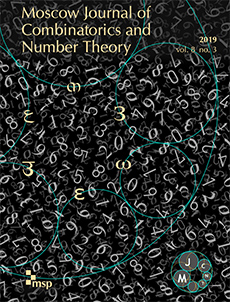Abstract
Let be positive integers. Let be a rational number. We denote by the -th Lerch function
with . When , this is the polylogarithmic function. Let be pairwise distinct algebraic numbers with (). We state a linear independence criterion over algebraic number fields of all the numbers: , , , , , , , , , , , , and . We obtain an explicit sufficient condition for the linear independence of values of the Lerch functions , , at distinct points in an algebraic number field of arbitrary finite degree without any assumptions on and . When , our result implies the linear independence of polylogarithms of distinct algebraic numbers of arbitrary degree, subject to a metric condition. We give an outline of our proof together with concrete examples of linearly independent polylogarithms.
Citation
Sinnou David. Noriko Hirata-Kohno. Makoto Kawashima. "Can polylogarithms at algebraic points be linearly independent?." Mosc. J. Comb. Number Theory 9 (4) 389 - 406, 2020. https://doi.org/10.2140/moscow.2020.9.389
Information





